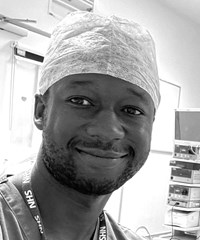ENT features
Endoscopic middle ear surgery for cholesteatoma treatment
A critical question when any new technique is proposed is ‘does it work?’ In this article Daniele Marchioni and Davide Soloperto discuss the success rates of endoscopic ear surgery for cholesteatoma. Introduction Surgical management of cholesteatoma is still a controversial...
What’s in a name?
Kate Granger is a doctor and the founder of the #hellomynameis campaign; she is also a cancer patient. In this article she explains why she started the campaign, and why patient-centred care starts with an introduction. Chris and me the...
International Federation of Head and Neck Oncologic Societies (IFHNOS): its programmes and impact on head and neck cancer worldwide
In the first article of this edition, we introduce IFHNOS, which has created a major impact on the landscape of head and neck cancer treatment and education over the past quarter of a century by offering a global platform amongst...
Harnessing head and neck cancer genomics for personalised medicine
Luc Morris updates us on the future of cancer diagnosis and treatment, which lies in “personalised oncology”, where specific molecular alterations of each tumour will be identified, and matched with actionable alterations in existing therapies, ushering in the era of...
The changing spectrum of cancer of the oropharynx: dilemmas and future directions
The association of HPV in oropharyngeal cancer has identified a ‘new disease’, with its unique biologic behaviour, and challenges for clinicians in selecting therapeutic combinations offering maximum efficacy and minimum morbidity or long-term sequela currently under study in clinical trials....
Robotic head and neck surgery: current state of the art and future innovations
Technology and innovation has provided modern head and neck surgeons with successive generations of robotic surgical systems, fibre-optic lasers, and novel tools which have ushered in a new era of minimally invasive surgery for tumours of the pharynx and larynx....
American Thyroid Association Thyroid Cancer Management Guidelines: utilising risk stratification to optimise patient care
The steep rise in thyroid surgery around the globe, has led to the development of risk stratification to define the indications for surgery and the extent of surgery as well as adjuvant therapies for papillary carcinoma, to avoid over treatment....
Head and neck cancer awareness
Head and neck cancer is one of the most preventable cancers, and awareness and screening campaigns have shown a decline in its incidence. Support for campaigns of awareness and education about these cancers is crucial from professional, societal and governmental...
A patient-centred approach from the patient’s point of view
Seeking help for hearing loss is often a big step for patients. Shari Eberts, a hearing health advocate living with hearing loss, explains why, and gives us her five top tips to improve patient-centred care in such cases. Sensorineural hearing...
Absorbing the hurt
In this article, taken from his blog, ENT surgeon John McGarva reminds us that while we can’t fix everything, we may still be able to help. It was a long time ago. I was a scarily young Houseman, barely 22,...
The James Lind Alliance – involving patients and their health professionals jointly in setting priorities for research
In a world of patient-reported outcomes and patient-centred care, patient-centred research must also be considered. That is where the James Lind Alliance (JLA) comes in, as Caroline Whiting explains below. Through Priority Setting Partnerships (PSPs), it allows patients, their carers...
Patient and public involvement in research
One step further from involving patients in setting research priorities is to involve them in the planning and recruitment stages of the subsequent trials and studies. Here, Carl Philpott and Aneeka Degun explain the concept of Patient and Public Involvement...




















